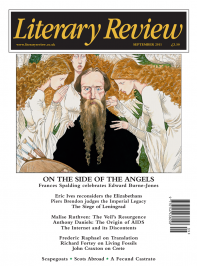Ursula K Le Guin
Towards Darkness
Ragnarök: The End of the Gods
By A S Byatt
Canongate 240pp £14.99
Retelling a great myth is like performing a famous piece of music: between faithfulness to the familiar score and personal interpretation of it lie many risks and choices. Between the worldview of a Norse skald, or poet, and that of a writer ten or fifteen centuries later, the scope for risks and choices is immense. Ragnarök, A S Byatt’s contribution to the Canongate Myths series, is a brilliant, highly intelligent, fiercely personal rendition of the Scandinavian mythology.
Its personal element has particular resonance for me because, like A S Byatt, I was a child during the Second World War. I, too, read the Norse myths, and like her I found they made sense of the strange world we were growing up in. But California was

Sign Up to our newsletter
Receive free articles, highlights from the archive, news, details of prizes, and much more.@Lit_Review
Follow Literary Review on Twitter
Twitter Feed
Alfred, Lord Tennyson is practically a byword for old-fashioned Victorian grandeur, rarely pictured without a cravat and a serious beard.
Seamus Perry tries to picture him as a younger man.
Seamus Perry - Before the Beard
Seamus Perry: Before the Beard - The Boundless Deep: Young Tennyson, Science, and the Crisis of Belief by Richard Holmes
literaryreview.co.uk
Novelist Muriel Spark had a tongue that could produce both sugar and poison. It’s no surprise, then, that her letters make for a brilliant read.
@claire_harman considers some of the most entertaining.
Claire Harman - Fighting Words
Claire Harman: Fighting Words - The Letters of Muriel Spark, Volume 1: 1944-1963 by Dan Gunn
literaryreview.co.uk
Of all the articles I’ve published in recent years, this is *by far* my favourite.
✍️ On childhood, memory, and the sea - for @Lit_Review :
https://literaryreview.co.uk/flotsam-and-jetsam